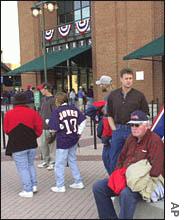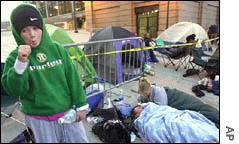|
Fans get a brake, not a break
|
 |
October 26, 2001: 3:11 p.m. ET
The economy is limiting teams' ability to hike tickets, but don't look for price cuts.
A twice weekly column by Staff Writer Chris Isidore
|
NEW YORK (CNNmoney) - Kevin Kitchens remembers being a college student taking his night-shift lunch hour to run over and watch his last place Braves lose, night after night. But when he had a chance to buy good playoff tickets for the Braves last weekend, he decided to stay home and watch the games on television instead.
"You just don't want to blow $60 on a ticket," he said, talking of the seats behind home plate that were available a week before the team's playoff series with the Arizona Diamondbacks. "Last year I took the family to the playoffs. But there's the factor, do I have that money to burn right now?"
Kitchens wasn't the only one who stayed home. The Braves had thousands of unsold seats for each of their three second-round playoff games last weekend. And the team is not unique in seeing the economy start to take a bite out of fans' appetite for tickets.
But while ticket price hikes will be smaller, or non-existent in the current economy, actual price cuts will continue be as rare as small-market teams in the postseason.

|
|
|
Braves fans had no problems getting tickets for last weekend's playoff games, as thousands of seats went unsold for each of three games. | |
Paul Adams, the Braves' director of ticket sales, said there were a number of factors in the disappointing playoff sales this year, including the fact that repeated postseason appearances for the team since 1991 have lessened the importance of the early rounds in fans' minds. But price and the economy are part of the reason for the empty seats as well.
"I think Atlanta has finally hit an economic slowdown," said Adams. "For the longest time we've been above all that."
The Braves got permission from Major League Baseball to price first-round seats at regular-season prices, rather that the premium charged by other teams. Adams said there would have been more empty seats in the first round if that hadn't happened.
Adams expects little if any pricing increase for 2002 regular season tickets.
"I know for a fact we were affected (by the economy) in our season ticket sales," said Adams, who saw 2001 season ticket sales fall by 16 percent. "When companies are laying people off, it's hard for them to justify buying season tickets again."
Even in New York, where courtside Knicks tickets now go for $1,600 each, and top seats to the hit Broadway show "The Producers" cost $480, there are apparently limits to what fans will pay. The three-time champion New York Yankees, will not raise 2002 ticket prices. The team, which set a franchise record per-game attendance this year, said it decided even before the Sept. 11 terrorist attack to not raise prices due to the weakening New York economy.
| |

|
|
Seattle Mariners fans camp out to buy playoff tickets. Despite softness in some ticket sales, demand is still strong for some top-dollar tickets. | |
An unprecedented eight National Hockey League teams, including the New York Rangers and New York Islanders, did not raise ticket prices this year, and three others will see lower average prices. The National Basketball Association is seeing the smallest price increase in a number of years, said Bernie Mullin, the league's senior vice president of marketing and team business operations.
"A portion of that decision is economy-based," said Mullin, who points out that many prices were set in the spring at the end of last season. A continued slowdown in the economy through the spring would impact 2002-2003 ticket prices. "You never want to make a decision sooner than you have to," he said.
Still the top-dollar tickets continue to go up, especially in new stadiums and arenas which have more premium seating available.
Tickets to the World Series that starts this weekend will cost between $110 to $175, with the "cheaper" seats up 16 percent and the top seats up 9 percent from last year's prices.
The St. Louis Blues hockey team significantly raised the price of its first four rows of seats, meaning that long-time season ticket holder Robert Samuelson, saw his four season tickets go to $100 each from $63.
It has left him angry and prompted him to go to fewer of the games than in the past, either selling or donating tickets to charity.
"People who used to like to go to one or two occasional games a year are saying no," said Samuelson. "In some cases I'm resorting to calling professional ticket brokers to see if they'll buy any of my seats."
A friend of his decided not to renew his nearby season tickets due to a combination of the price hike and the economy.
"He's retired, and this increase just went past what he set aside every year in his retirement budget," said Samuelson. "Also with the economy being the way it is, he's not making nice big percentages off his investments anymore."
Sports consultant Marc Ganis, president of SportsCorp Ltd., said that there generally will be demand for top-end tickets, as well as for most teams' cheapest tickets. It's the mid-price tickets that will be most affected by the downturn in the economy.
But Ganis said fans shouldn't get their hopes up for lower prices for most seats any time soon.
"Even with the economy, it won't be a recession in ticket pricing," he said. "It'll just be a slower rate of growth." 
Click here to send mail to Chris Isidore
|
|
|
|
|
 |

|

